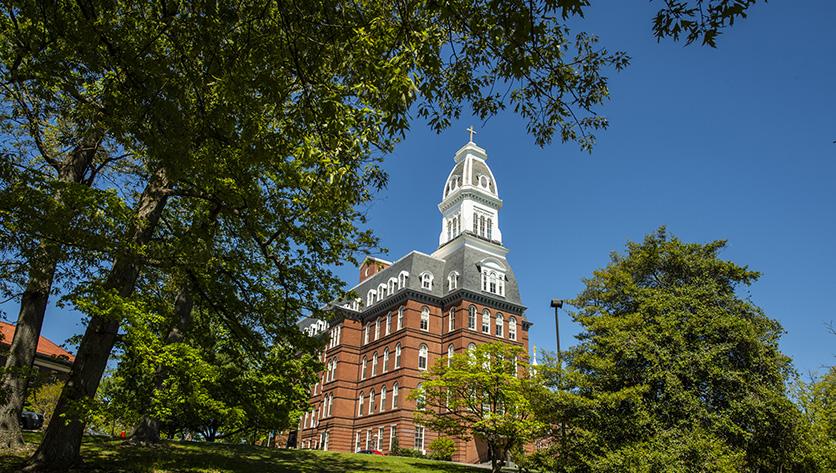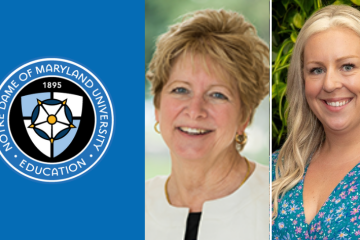School of Education Leads Innovative Degree Apprenticeship Program to Address Teacher Shortage

By: Erik Pedersen, Senior Communications Manager
BALTIMORE – Notre Dame of Maryland University’s School of Education continues to play a central role in helping address teacher shortages across the state, with a new grant of $249,553 providing an innovative pathway for paraprofessionals to earn a bachelor’s degree and special education certification through a degree apprenticeship program – the first of its kind in Maryland.
NDMU’s Elevates program, made possible through a grant awarded by the Maryland State Department of Education, will be implemented through partnerships with John Ruhrah Elementary/Middle School in Baltimore and the Harbour School in Annapolis. Five paraprofessionals at each school will be selected to participate in the 60-credit pilot initiative. After completing all requirements for degree completion and certification, participants will be required to teach in their sponsoring school system for a minimum of two years.
“The School of Education is proud to have this opportunity to increase access to higher education for paraprofessionals in our partner schools who may not otherwise have the resources to move forward as a certified teacher,” said Dr. Kathryn Doherty, dean of NDMU’s School of Education. “NDMU Elevates is an innovative program that builds on the rigor of the School of Education curriculum, while recognizing the extensive on-the-job experience that paraprofessionals and support staff bring to their work every day. It is a nontraditional pathway to transform lives, and places us at the forefront of new models of education to serve diverse communities.”
Participants will earn 15 credits through 144 hours of traditional coursework. The remaining 45 will be obtained via 2,000 hours of training through an apprenticeship, which includes a year-long internship with a mentor teacher and completion of competency-based activities and experiences. The apprenticeship will focus on applying 22 high-leverage practices created by two national organizations with expertise in special education: the Council for Exceptional Children and the Center for Collaboration for Effective Educator Development, Accountability, and Reform.
High-leverage practices are educational practices that all special educators must master before they begin teaching, and they are aligned to four areas – collaboration, assessment, social/emotional/behavioral, and instruction. Participants will be evaluated on their success developing their skills in these areas through a collaboration between their mentor teacher and NDMU faculty members.
“The high-leverage practices clearly align with the apprenticeship model of the Elevates project,” said Carol Rabin, co-director of the initiative. “They provide a framework of the essential effective teaching practices that participants will learn and demonstrate throughout their apprenticeship and competency-based activities.”
Since NDMU’s Educator Degree Apprenticeship is the first such program in Maryland, the NDMU School of Education, as part of the grant approval process, will be creating a step-by-step guidebook for the program’s development and implementation for the Maryland State Department of Education. This guidebook will be made available as a resource for other education preparation programs in the state to create similar initiatives in the future.
A majority of the country is currently experiencing a scarcity of teachers, and the nationwide issue is particularly pronounced among special educators, with a recent report stating that 48 states and the District of Columbia had a shortage of available special education teachers. Several states have successfully implemented teacher apprenticeship programs in response.
College-connected apprenticeships offer academic credit for a portion of the classroom requirements through the on-the-job learning components of an apprenticeship, providing the opportunity for competency-based learning. This type of apprenticeship can expedite degree completion while still providing employers (in this case, schools) with much needed staff, and employees with a living wage and an upwardly mobile career pathway. Apprenticeship programs are also a crosswalk to increased college access, diversity, and opportunity.
NDMU has long-standing partnerships with both schools included in the Elevates program. John Ruhrah Elementary/Middle, which has the largest English as a Second Language population out of all schools in Baltimore, has been a part of NDMU’s Professional Development School Partnership Network since 2010. The School of Education was recently able to provide a variety of technology upgrades to John Ruhrah through the awarding of a separate state grant. At the Harbour School, cohorts of teachers complete NDMU’s certification programs each year, and the institution also serves as an internship site for Notre Dame students.
The first steps of the NDMU Elevates program will launch in March, with students expected to achieve degree and certification completion within 18-24 months. Dr. Doherty hopes that this pilot initiative will continue beyond expiration of the initial grant funding.
“This is certainly a program that we would like to expand on in future years,” she said. “It has given us several opportunities to think outside of the box, and we’re excited to get started this semester.”
Established in 1895, Notre Dame of Maryland University (NDMU) is a private, Catholic institution in Baltimore, Maryland, with the mission to educate leaders to transform the world. Notre Dame has been named one of the best "Regional Universities North" by U.S. News & World Report.




